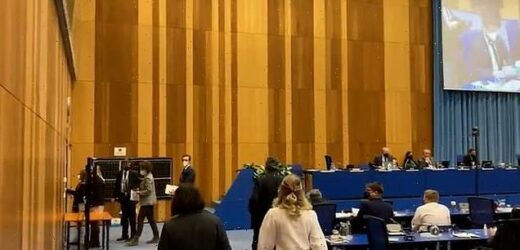The world turns its back on Russia again: Dramatic moment EU delegates WALK OUT as Russian diplomat ‘spreads disinformation about the Ukraine war’ at UN nuclear conference in Austria
- EU delegates walked out of a conference during the Russian ambassadors’ talk
- The UN nuclear watchdog was chairing the meeting when delegates walked out
- The EU condemned Russia for its military activity around nuclear facilities
- ‘Russia is actively spreading disinformation and falsehoods,’ said the EU
- The remarks came soon after an blackout occurred at Chernobyl
- Click here to read MailOnline’s liveblog with the latest updates on Ukraine
The EU led a walkout of delegates in Vienna during a speech from the Russian ambassador to the UN on Wednesday for the second time in two weeks.
Delegates filed out of the room after ‘unacceptable remarks’ from the Russian ambassador, speaking at a meeting of the UN nuclear watchdog’s board of governors, the International Atomic Energy Agency (IAEA).
‘As a sign of solidarity with Ukraine, the EU Ambassadors & others decided to walk-out when the Russian Ambassador was reading his statement at the Board of Governors of the IAEA,’ an EU spokesperson told MailOnline.
‘We cannot be expected to sit by while Russia is actively spreading disinformation & falsehoods regarding the invasion and the war in Ukraine and its aggression against Ukrainian population.’
The EU led a walkout of delegates from a UN meeting during a speech from the Russia on Wednesday for the second time in two weeks.
EU delegates walked out of the assembly hall after condemning Russia for carrying out ‘indiscriminate attacks’ around nuclear facilities in Ukraine, including Chernobyl
In an opening statement, the EU called for Russia to immediately cease all military operations near all nuclear facilities in Ukraine in its opening remarks.
Ukraine is in full compliance with its obligations under the Nuclear Non-Proliferation Treaty, added the EU, urging Russian officials to ‘immediately stop their false allegations.’
The EU said it was distributed by ‘unfounded accusations and wrongly claim that Ukraine is about to acquire nuclear weapons’, in a press release published after the meeting.
It said Russia had conducted ‘indiscriminate attacks’ on or around the Chornobyl Exclusion Zone, the Zaporizhzhya Nuclear Power Plant, and most recently on a research neutron source facility in Kharkiv.
When Russian ambassador to the UN began talking, the EU delegates walked out of the assembly hall.
‘We are extremely concerned by the nuclear safety, security and safeguards risks caused by the Russian invasion on Ukraine and the potential damage to its nuclear facilities that could have significantly adverse impact,’ said the EU in its statement.
The Ukrainian government informed the IAEA of a power loss at the decommissioned Chernobyl Nuclear Power Plant on Wednesday.
The UN’s nuclear watchdog’s view on the risk posted by the blackout seemed at odds with remarks made by Ukrainian officials on Wednesday.
Nuclear power plants require electricity to cool spent fuel rods, the risk being that dry rods could contaminate wider areas if left unattended with insufficient water.
But the fuel rods at Chernobyl have been depleted for decades, posing little risk of increased radiation, pointed at the IAEA.
The IAEA said the volume of cooling water in Chernobyl is ‘sufficient for effective heat removal without [the] need for electrical supply’.
‘In this case IAEA sees no critical impact on safety,’ added the UN’s nuclear watchdog.
But Dmytro Kuleba, minister of foreign affairs of Ukraine, said the risk was imminent.
Russian forces captured the deactivated Chernobyl reactor in the first few days of the invasion
A fire is seen at the Zaporizhzhia nuclear plant – the largest in Europe – after it was attracted by Russian forces early on Friday morning Energodar, Ukraine, March 4
‘Reserve diesel generators have a 48-hour capacity to power the Chornobyl NPP,’ he said on Wednesday.
‘After that, cooling systems of the storage facility for spent nuclear fuel will stop, making radiation leaks imminent.’
The IAEA has lost contact with Chernobyl’s nuclear data systems, making the situation difficult to monitor.
‘I call on the international community to urgently demand Russia to cease fire and allow repair units to restore power supply,’ added Kuleba.
Despite the uncertainty, the Russian invasion of Ukraine has seen Russian troops attack infrastructure of nuclear facilities on multiple occasions.
The EU said an attack on a safeguarded nuclear facility would prompt a situation where the UN Security Council ‘would have to act immediately in accordance with the provisions of the UN Charter,’ threatening further action.
‘The international community will hold Russia accountable for its aggression including the nuclear safety and security threats it is causing,’ added the EU, shortly before its delegates staged the walk out.
Russian forces fired rockets at a physics institute in the city of Kharkiv on March 6 that contains nuclear material and a reactor which Ukraine’s national security service warned could lead to a large-scale ecological disaster if hit.
The science institute houses the Neutron Source nuclear research facility and contains 37 nuclear fuel cells in its core, according Ukrainian foreign minister Emine Dzheppar.
The attack came two days after Russian forces shelled Europe’s largest nuclear power plant in Zaporizhzhia, sparking fears of a nuclear disaster similar to the Chernobyl disaster in 1986.
On March 1, dozens of diplomats from around the world walked out during a speech by Russian Foreign Minister Sergei at a Geneva disarmament conference in protest against Moscow’s war in Ukraine.
Source: Read Full Article





